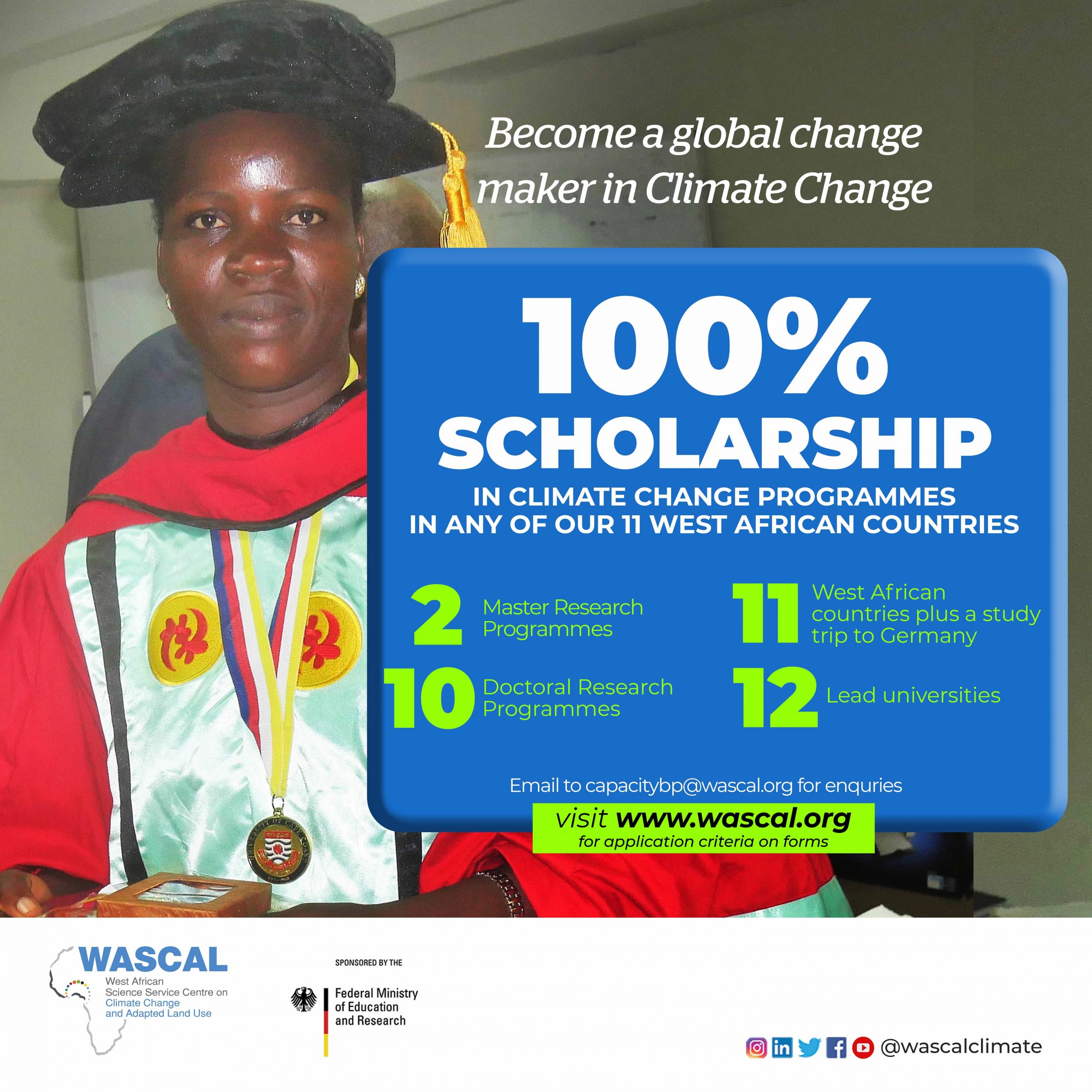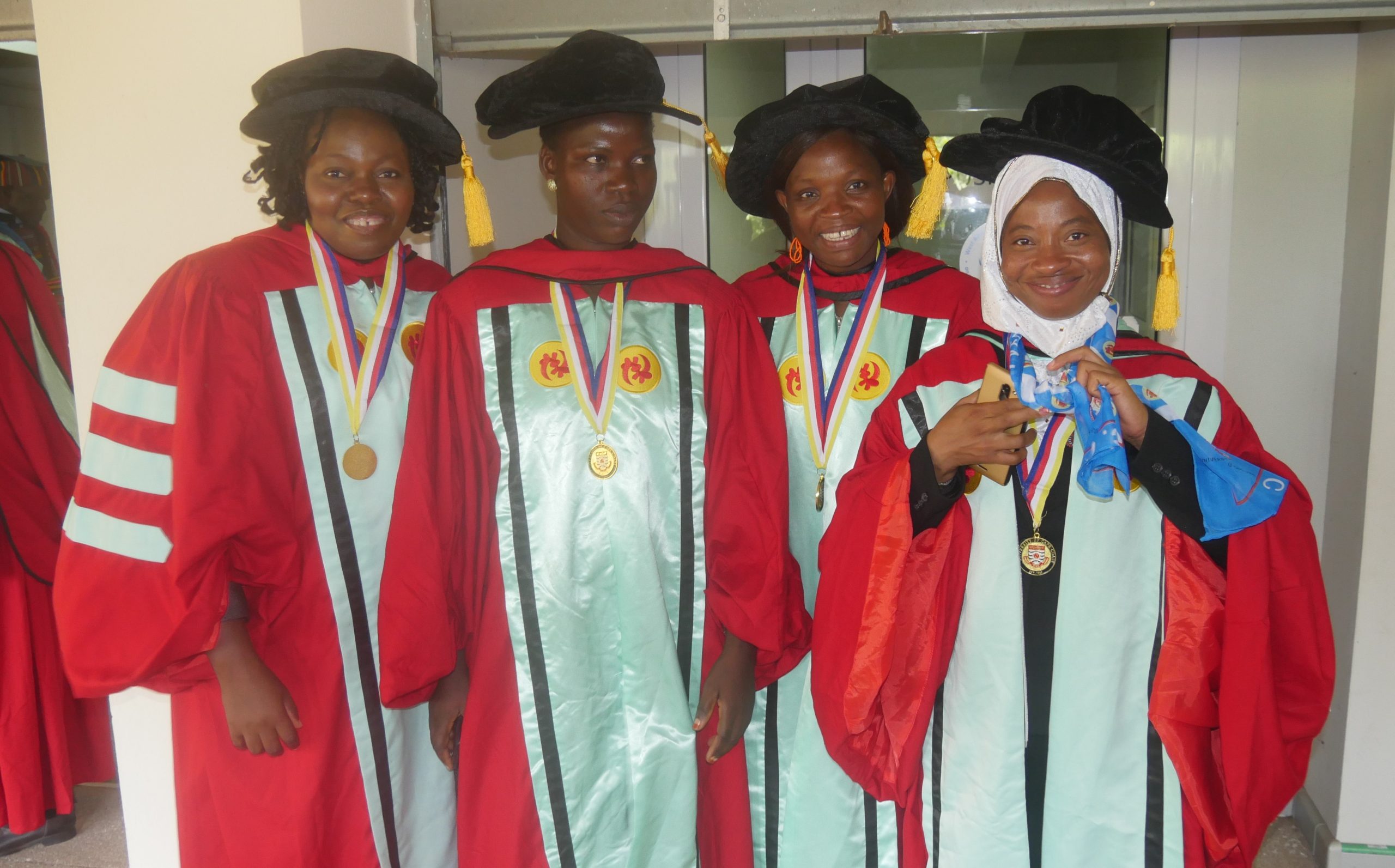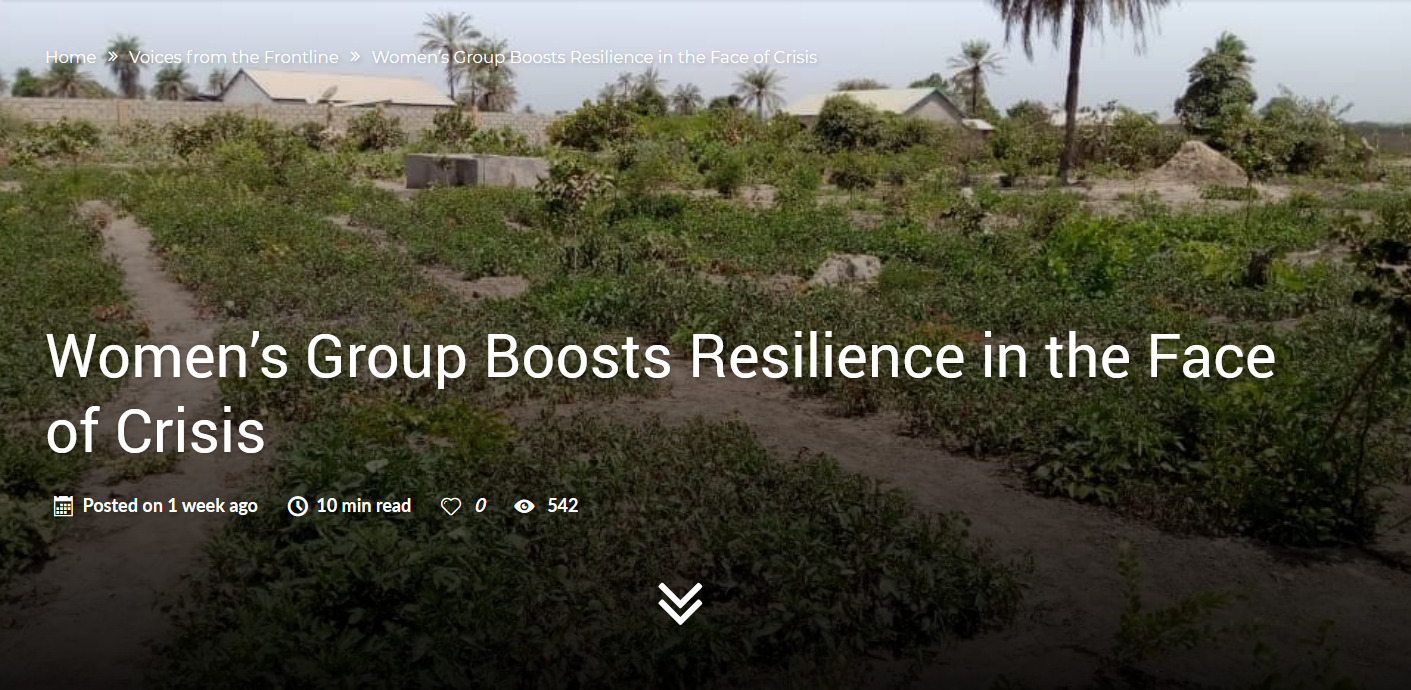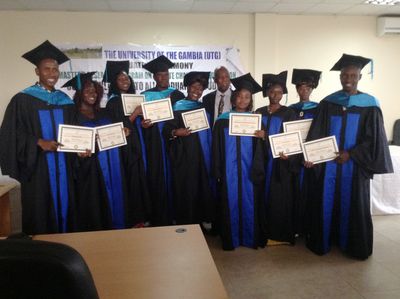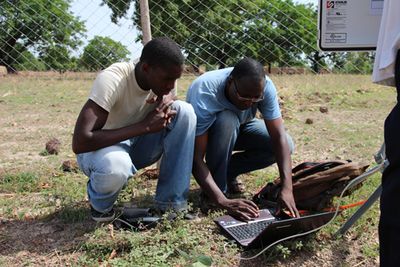Download the Application Form Below Application Form – Master Research Program on Informatics for Climate Change Université Joseph KI-ZERBO, Ouagadougou Download the Application Form Below Application Form – PhD in Continue Reading
DOWNLOAD LINK https://wascal.org/wp-content/uploads/2021/02/WASCAL-FACT-SHEET-GAMBIA-press-002.pdf
BY: AMMA BIRAGO KANTANKA GYIMAH PhD Student, Doctoral Research Programme, Climate Change and Education WASCAL – University of the Gambia On the occasion of the International Day for Women and Continue Reading
Mama Jobe Jeng is a farmer in The Gambia’s west coast region and member of the local organisation Tresor Women Warrior. She recounts how belonging to the group has strengthened Continue Reading
The two-day meeting was attended by representatives from four West African countries – The Gambia, Liberia, Nigeria and Ghana.
“In West Africa we have a population of about 348 million and looking at what WASCAL has done so far, producing about 200 research scientists, our projection is to have about 3,000 climate scientists
“In West Africa we have a population of about 348 million and looking at what WASCAL has done so far, producing about 200 research scientists, our projection is to have about 3,000 climate scientists by the year 2020,”
The West Africa Science Service Centre on Climate Change and Adapted Land Use (WASCAL) is to train about 3,000 research scientists by the year 2020.
This is intended to contribute to efforts by member countries of WASCAL to fight the effects of climate change on the West African sub-region and also improve the resilience of West African countries to climate change and climate variability.
The Director, Capacity Building, WASCAL, Professor Janet Olatundun Adelegan, gave the hint yesterday, when she presented a brief on WASCAL’s capacity-building programme, during the opening ceremony of a sub-regional consultative meeting on climate change in Accra.
Ghana News Headlines
For today’s latest Ghana news, visit Graphic Online headlines page Ghana news headlines.
The two-day meeting was attended by representatives from four West African countries – The Gambia, Liberia, Nigeria and Ghana.
“In West Africa we have a population of about 348 million and looking at what WASCAL has done so far, producing about 200 research scientists, our projection is to have about 3,000 climate scientists by the year 2020,” Prof. Adelegan said.
She explained that the centre was expected to organise short courses and workshops to complement the major courses which would be demand-driven and focused on the priorities of countries in the sub-region, so as to make them relevant.
Essence of meeting
The Executive Director of WASCAL, Dr Laurent G. Sedogo, said the meeting was the last of three sub-regional consultative meetings that were “aimed at identifying common research and capacity building needs of different member countries for consideration in a final regional meeting in a few months” in Ouagadougou.
He said WASCAL had commissioned national and regional consultative meetings and had so far held 14 of such , to solicit the inputs of partners and customers for their research agenda for 2017 to 2020.
“Our overarching objective is to integrate, as much as possible, the research and capacity-building needs expressed by our partners into our research agenda, so as to make our research findings and the climate services relevant to the needs of the ECOWAS region,” he stated.
Sense of ownership
The Deputy Head of Mission and Head of the Economic Section of the German Embassy, Mr Bernhard Abels, who was the special guest of honour, said the Federal Ministry of Education and Research (BMBF) and Germany wished that through the consultative workshops, member countries would develop a high sense of ownership of the WASCAL programme and agenda.
He said the BMBF also hoped that African countries would increasingly commit human and financial resources to achieve the ultimate goal of significantly reducing the effects of climate change and climate variability on human and environmental systems.
Citing some of the effects of climate change on the West African sub-region, Mr Abels said, “As the main source of livelihood for majority of the populace, rain-fed agriculture is becoming unattractive and unbeneficial for millions of smallholder farmers due to factors such as delayed start of rains, long spells during the season and declining soil fertility.”
He indicated that it was to reduce the impact of climate change that over €30 million had already been invested in infrastructure, scientific equipment, capacity building and research by German and African scientists in the last five years.
Please note: The call for application has been extended to January 22, 2016.
WASCAL (West African Science Service Center on Climate Change and Adapted Land Use) is a large-scale research-focused Climate Service Center designed to help tackle severe challenges posed by climate change and thereby enhance the resilience of human and environmental systems to climate change and increased variability. It does so by strengthening the research infrastructure and capacity in West Africa related to climate change and by pooling the expertise of ten West African countries and Germany. Through the Graduate Studies Program WASCAL’s Capacity Building Program helps educate the next generation of scientists to attain an intimate knowledge of different climate related issues in order to help the region develop suitable management strategies.
The WASCAL Graduate Studies Program supports four Master’s and six Doctoral Programs implemented at ten lead Universities across West African countries. WASCAL provides full scholarships to the Doctoral and Master’s students in all the ten lead Universities with comprehensive training and research support. Doctoral students may spend up to six months at a host institution in Germany. The language of instruction is English. English and French language training programs are provided for all graduate students. Graduate students have access to the research facilities set up through WASCAL funding and located at various watersheds in West Africa. German partner universities collaborate with the Doctoral and Master’s Programs in the areas of curriculum development, visiting professorships and co-supervision of graduate students.
The WASCAL Graduate Studies Program offers its students:
High quality research and education on climate change and its impact on human environmental systems.
Up to six months at a host institution in Germany (Doctoral Programs only!)
Interdisciplinary working approach
International lecturers and supervisors
English language classes
Scholarship and research budget, including a personal laptop computer
Doctoral Programs
West African Climate System
Federal University of Technology, Akure (FUTA), Nigeria
Apply now: Download call for applications and application form and the recommendation letter
Climate Change and Water Resources
Université d’Abomey-Calavi (UAC), Benin
Apply now: Download call for applications and application form
Climate Change Economics
Université Cheikh Anta Diop de Dakar (UCAD), Senegal
Apply now: Download call for applications and application form
Climate Change and Biodiversity
Université Felix Houphouet Boigny (formerly Université de Cocody‐Abidjan), Côte d‘Ivoire
Apply now: Download call for applications and application form
Climate Change and Land Use
Kwame Nkrumah University of Science and Technology (KNUST), Ghana
Apply now: Download call for applications and referee form and application form
Climate Change and Agriculture
L’Institut Polytechnique Rural de Formation et de Recherche Appliquée, (IPR-IFRA), Mali and University of Cape Coast, Ghana
Apply now: Download call for applications and application form
Time Frame
The time frame of the doctoral programs is three and a half years. During the first three months, students take English and/or French language classes and common courses at the language centers. During the next 6 months student participate in lectures at their Graduate Research Program and prepare their proposals. After their proposals have been approved by their supervisors, the students conduct their field research for 12 to 24 months. For the remaining period of time, students will write up their thesis and are offered to spend up to six months at a German host institution.
Requirements
Candidates applying for a Doctoral Program must have a Master’s degree in a relevant discipline in addition to a BSc degree (second class upper division).
Citizenship in one of the WASCAL member country (Bénin, Burkina Faso, Côte d’Ivoire, The Gambia, Ghana, Niger, Mali, Nigeria, Sénegal, Togo)
Five credits including Mathematics and English Language that are also equivalent to Francophone university grading system
Gender-balanced selection decision
Applicant should show proficiency in English Language.
Meet additional requirement of the lead university
Master’s Programs
Climate Change and Human Security
University of Lomé, Togo
Apply now: Download call for applications and application form
Climate Change and Education
University of The Gambia (UTG), The Gambia
Apply now: Download application form
Climate Change and Energy
Université Abdou Moumouni de Niamey (UAM), Niger
Apply now: Download call for applications and application form
Climate Change and Adapted Land Use
Federal University of Technology, Minna, Nigeria
Apply now: Download application form
Time Frame
The time frame for the Master’s programs is two years. During the first year students participate in the course program of their Graduate Research Program and work on their research outline. Research will be conducted during the second year within a period of six to nine months. Students finish the program with writing up their thesis during the last three to six month.
Requirements
Candidates applying for Master’s Program must have a minimum BSc degree (second class upper division) in a discipline relevant to the respective program.
Citizenship in one of the WASCAL member country (Bénin, Burkina Faso, Côte d’Ivoire, The Gambia, Ghana, Niger, Mali, Nigeria, Sénegal, Togo)
Five credits including Mathematics and English Language that are also equivalent to Francophone university grading system
Gender-balanced selection decision
Applicant should show proficiency in English Language.
Meet additional requirement of the lead university
Application Process
The application process is handled jointly by WASCAL and the individual Graduate Programs. Applications can be submitted online to any of the Graduate Studies Program for the 2015/2015 season until January 22, 2016. The details of the application process can be found at the respective programs pages (see linkes above). Shortlisted candidates will be contacted and invited for interviews by January 29, 2016.
More information on the Graduate Studies Program and on open applications can be found here or at the respective universities websites.
Nine students graduated successfully at the WASCAL Master Research Program “Climate Change and Education” at the University of the Gambia. In the picture: The graduates at the celebration ceremony on December 2, 2015.
The two-year Master’s Research Program on Climate Change and Education in the Gambia builds climate change expertise of students from the ten West African WASCAL countries in an inspiring, multi-disciplinary and intercultural learning environment.
Each year, ten to twenty students are admitted to the program, which has a focus on developing skills in communication, education and public relations. These skills are highly relevant for policy-advice, public awareness building on climate change, as well as for the implementation of adaptation programs.
In the picture, from left to right:
1. Mamoudou BA
ASSESSMENT OF FARMERS’VULNERABILITY TO CLIMATE CHANGE IN THE NORTH BANK REGION, THE GAMBIA
2. Fatou BOJANG
AWARENESS OF VEGETABLE PRODUCER S ABOUT CLIMATE CHANGE AND THE LEVEL OF EXTENSION SERVICES PROVIDED IN LOWER REGION OF THE GAMBIA
3. Cynthia KUTIR
FARMERS’S AWARENESS AND RESPONSE TO CLIMATE CHANGE IN THE NORTH BANK REGION, THE GAMBIA
4. Abdoulaye BORE
FLOOD VULNERABILITY ASSESSMENT AND ADAPTATION RESPONSES: CASE STUDY OF BASSE, THE GAMBIA
5. Constantine A. A. KOUEVI
IMPACT OF DROUGHT ON LIVELIHOOD RELATED MIGRATION IN FOUR COMMUNITIES IN THE NORTH BANK REGION OF THE GAMBIA
6. Corine B. L. SINSIN
ECOSYSTEM-BASED ADAPTATION TO CLIMATE CHANGE THROUGH PRIORITIZATION OF CROP WILD RELATIVES: THE CASE OF THE GAMBIA
7. Afi KAVEGUE
IMPACTS OF FLOODING AND COPING MECHANISMS ON SCHOOL CHILDREN RESIDING IN EBO TOWN, KANIFING MUNICIPALITY, THE GAMBIA
8. Pauline ATTEMENE
SUSTAINABILITY-RELATED COMMUNICATION IN THE CONTEXT OF CLIMATE CHANGE: A CASE STUDY OF SELECTED GAMBIAN ECOTOURISM AREAS
9. Abdoul-Rasmane BAGAGNAN
FARMERS’PERCEPTIONS AND RESPONSE TO CLIMATE VARIABILITY IN THE CENTRAL RIVER REGION OF THE GAMBIA
Update: The deadline has been postponed to february 29, 2016
Applicants must have completed all course requirements for the degree as well as be in the research and/or writing phase of the dissertation. The dissertation must be on climate change and any of the thematic areas of biodiversity, agriculture, adapted land use, climate systems, education, human security, economics and energy. In addition, applicants should not have received any other funding to support the dissertation activities outlined in the PhD or MSc proposal/budget. Priority is given to candidates pursuing a career in government ministries, research and/or teaching at a public institution in West Africa.
Requests should be supported by the following documentation:
Evidence of an attachment to, or sponsorship by, an institution in West Africa engaged in government ministries, research and/or training in the public sector in the region.
Evidence of registration in a recognized PhD or MSc program in a relevant area.
An approved research proposal, complete with clearly defined objectives, substantial literature review and a well-outlined analytical framework, as well as pertinent research methodology.
A statement of limitations and policy relevance of the study.
A letter of reference from the thesis supervisor, and a letter of institutional support from the Head of Department.
A detailed budget including evidence of any additional financial support that may be necessary to complete the program.
Curriculum vitae.
Processing of Application for PhD Thesis Research Award
Upon the receipt of the proposal and the supporting documentation, it is sent to two external reviewers in the relevant programs of the WASCAL Graduate Studies Program, who comment on the adequacy of the proposal. In the event that the reviewers suggest corrections to be made and give positive feedback, the comments are sent to the students to incorporate and then resubmit the revised proposal for a final review. Once the proposal is cleared by at least two reviewers, it is presented together with the comments from the external reviewers to the Thesis Grant Sub-Committee of the Graduate Studies Program, who will go through the recommendations of the reviewers and make recommendation to the Capacity Building Department of WASCAL to approve for thesis funding. It is after this that research grants can be awarded.
Application Deadlines for 2015/2016 Academic Session
The PhD and MSc Thesis Research Awards applications deadline is January 30, February 29, 2016.
Proposal and supporting documents for thesis grant should be sent to:
The Director of Capacity Building,
WASCAL Accra Office, CSIR Office Complex,
Agostino Neto Road, Airport Residential Area, PMB CT 504, Cantonments-Accra.
Email: intern.w(at)wascal.org; weto.s(at)wascal.org
Note: The call for application has been extended to January 22, 2016. Read more
WASCAL (West African Science Service Center on Climate Change and Adapted Land Use) is a large-scale research-focused Climate Service Center designed to help tackle severe challenges posed by climate change and thereby enhance the resilience of human and environmental systems to climate change and increased variability. It does so by strengthening the research infrastructure and capacity in West Africa related to climate change and by pooling the expertise of ten West African countries and Germany. Through the Graduate Studies Program WASCAL’s Capacity Building Program helps educate the next generation of scientists to attain an intimate knowledge of different climate related issues in order to help the region develop suitable management strategies.
The WASCAL Graduate Studies Program supports four Master’s and six Doctoral Programs implemented at ten lead Universities across West African countries. WASCAL provides full scholarships to the Doctoral and Master’s students in all the ten lead Universities with comprehensive training and research support. Doctoral students may spend up to six months at a host institution in Germany. The language of instruction is English. English and French language training programs are provided for all graduate students. Graduate students have access to the research facilities set up through WASCAL funding and located at various watersheds in West Africa. German partner universities collaborate with the Doctoral and Master’s Programs in the areas of curriculum development, visiting professorships and co-supervision of graduate students.
The WASCAL Graduate Studies Program offers its students:
High quality research and education on climate change and its impact on human environmental systems.
Up to six months at a host institution in Germany (Doctoral Programs only!)
Interdisciplinary working approach
International lecturers and supervisors
English language classes
Scholarship and research budget, including a personal laptop computer
Doctoral Programs
West African Climate System
Federal University of Technology, Akure (FUTA), Nigeria
Apply now: Download call for applications and application form and the recommendation letter
Climate Change and Water Resources
Université d’Abomey-Calavi (UAC), Benin
Apply now: Download call for applications and application form
Climate Change Economics
Université Cheikh Anta Diop de Dakar (UCAD), Senegal
Apply now: Download call for applications and application form
Climate Change and Biodiversity
Université Felix Houphouet Boigny (formerly Université de Cocody‐Abidjan), Côte d‘Ivoire
Apply now: Download call for applications and application form
Climate Change and Land Use
Kwame Nkrumah University of Science and Technology (KNUST), Ghana
Apply now: Download call for applications and referee form and application form
Climate Change and Agriculture
L’Institut Polytechnique Rural de Formation et de Recherche Appliquée, (IPR-IFRA), Mali and University of Cape Coast, Ghana
Apply now: Download call for applications and application form
Time Frame
The time frame of the doctoral programs is three and a half years. During the first three months, students take English and/or French language classes and common courses at the language centers. During the next 6 months student participate in lectures at their Graduate Research Program and prepare their proposals. After their proposals have been approved by their supervisors, the students conduct their field research for 12 to 24 months. For the remaining period of time, students will write up their thesis and are offered to spend up to six months at a German host institution.
Requirements
Candidates applying for a Doctoral Program must have a Master’s degree in a relevant discipline in addition to a BSc degree (second class upper division).
Citizenship in one of the WASCAL member country (Bénin, Burkina Faso, Côte d’Ivoire, The Gambia, Ghana, Niger, Mali, Nigeria, Sénegal, Togo)
Five credits including Mathematics and English Language that are also equivalent to Francophone university grading system
Gender-balanced selection decision
Applicant should show proficiency in English Language.
Meet additional requirement of the lead university
Master’s Programs
Climate Change and Human Security
University of Lomé, Togo
Apply now: Download call for applications and application form
Climate Change and Education
University of The Gambia (UTG), The Gambia
Apply now: Download application form
Climate Change and Energy
Université Abdou Moumouni de Niamey (UAM), Niger
Apply now: Download call for applications and application form
Climate Change and Adapted Land Use
Federal University of Technology, Minna, Nigeria
Apply now: Download application form
Time Frame
The time frame for the Master’s programs is two years. During the first year students participate in the course program of their Graduate Research Program and work on their research outline. Research will be conducted during the second year within a period of six to nine months. Students finish the program with writing up their thesis during the last three to six month.
Requirements
Candidates applying for Master’s Program must have a minimum BSc degree (second class upper division) in a discipline relevant to the respective program.
Citizenship in one of the WASCAL member country (Bénin, Burkina Faso, Côte d’Ivoire, The Gambia, Ghana, Niger, Mali, Nigeria, Sénegal, Togo)
Five credits including Mathematics and English Language that are also equivalent to Francophone university grading system
Gender-balanced selection decision
Applicant should show proficiency in English Language.
Meet additional requirement of the lead university
Application Process
Note: The call for application has been extended to January 22, 2016. Read more
The application process is handled jointly by WASCAL and the individual Graduate Programs. Applications can be submitted online to any of the Graduate Studies Program for the 2015/2015 season until January 8, 2016. The details of the application process can be found at the respective programs pages (see linkes above). Shortlisted candidates will be contacted and invited for interviews by January 15, 2016.
More information on the Graduate Studies Program and on open applications can be found here or at the respective universities websites.


